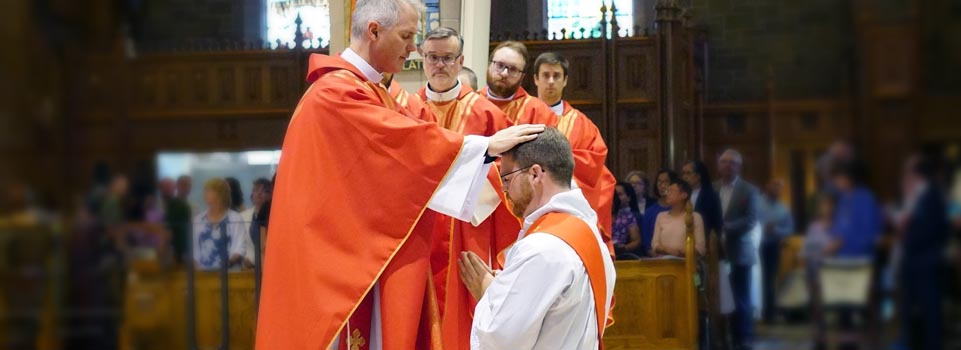
Holy Orders is the sacrament through which men become ordained ministers of the “apostolic ministry” of Christ (CCC 1536). Through Holy Orders “the mission entrusted by Christ to his apostles continues to be exercised in the Church until the end of time” (CCC 1536).
Holy Orders includes three degrees: episcopate (bishops), presbyterate (priests) and diaconate (deacons).
Through presbyteral ordination a man becomes a priest. Through Holy Orders, “priests, by the anointing of the Holy Spirit, are signed with a special character and so are configured to Christ the priest in such a way that they are able to act in the person of Christ the head” (CCC 1563).
Presbyteral ordination enables a man to share in the ministry of the bishop. The main roles of the priest are preaching, celebrating the sacraments, and exercising servant leadership after the model of Our Lord. Ordination enables the priest to offer the Body and Blood of Christ in the Eucharist, forgive sins in the sacrament of Reconciliation, and celebrate the sacraments of Baptism, Marriage and Anointing of the Sick. Priesthood also embraces the exercise of spiritual leadership, the teaching of faith and morals, formation of lay leaders, and whatever other duties are deemed necessary by his bishop or religious Superior.
Episcopal ordination and consecration is the fullest level of the Sacrament of Holy Orders whereby a man becomes a bishop and it follows after a man has been ordained as both a deacon and a priest. In an episcopal ordination, three bishops lay hands on the priest being ordained a bishop, and his head is anointed with chrism oil, an oil blessed by a bishop for use in sacraments. The bishop has a three-fold mission to teach, govern, and sanctify the faithful of his diocese, sharing these duties with the priests and deacons who serve under him. As a prophet, he shares and promotes the Word of God. As a shepherd, he cares for all people in the diocese where he is appointed by the Pope to serve, especially the poor and the suffering. The bishop’s staff (crozier) symbolizes his role as spiritual shepherd of his flock. In his priestly role, the bishop has responsibility for the proper celebration of the liturgy and the sacraments in his diocese
An archbishop governs a diocese known as an archdiocese, which is the chief diocese of an ecclesiastical province. The ecclesiastical province of Edmonton also includes the dioceses of Calgary and St. Paul.
Diaconal ordination enables a man to serve the Church through ministries of Word, worship, pastoral care and charity. A deacon may baptize, preach, and officiate at marriages and funerals, but he cannot preside at Eucharist or give absolution. Before someone is ordained a priest, he is first ordained to the order of deacon (also known as transitional deacon).
There are also permanent deacons, who serve the Church as directed by the bishop but will not be ordained to the priesthood. Unlike celibate priests in the Roman Catholic tradition, permanent deacons may be married men. Deacons are called to carry Christ and the Gospel to their workplaces, places of relaxation, and to the heart of their family life.
For more information about the priesthood in our local Archdiocese, visit the website for St. Joseph Seminary.
For more information on becoming a permanent deacon, see here.
